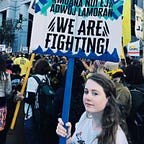How California Can End the Era of Throwaway Plastic Packaging
Approving SB 54 and AB 1080 would be a good start
Every day, plastic lids, bottles, wrappers, bags and other single-use packaging generate tons of waste in California. It fills our landfills and litters our oceans and landscapes. Getting single-use plastic packaging out of our waste stream is essential and long overdue — and California can adopt that goal right now.
Senate Bill 54 and Assembly Bill 1080 would each create a comprehensive statewide plan to address the plastic pollution crisis. They aim to reduce throwaway packaging by 75 percent by 2030 and ensure the packaging that remains is reusable, recyclable or compostable. [9/16/2019 Update: The California Legislature failed to approve these bills before the session ended, but they remain eligible to be taken up in the next session starting in January 2020.
8/25/2020 Update: The deadline for reducing plastic packaging was amended to 2032. Both bills have until Aug. 31 to be approved by the Legislature.]
As the world’s fifth-largest economy, California can have a major impact on ocean plastic pollution, which is expected to outweigh all the fish the sea by 2050 if we don’t change our ways.
Plastic pollution has a direct and deadly effect on marine wildlife. Thousands of seabirds, sea turtles and marine mammals are killed each year after ingesting plastic or becoming entangled in it. Endangered wildlife like Pacific loggerhead sea turtles and Hawaiian monk seals are just two of the nearly 700 species that eat and get caught in ocean plastic pollution each year.
Plastic also presents an environmental justice challenge across the country. Industry’s plan to increase production of throwaway plastic by 40 percent over the next decade is a serious threat to not only marine wildlife and the climate, but also public health.
The companies and the facilities producing plastic are poisoning communities across the United States and around the world. Dioxin, phthalates, ethylene oxide, formaldehyde, and benzene are only some of the deadly carcinogens emitted during plastic production.
The petrochemical plants that create plastic and the incinerators that burn plastic packaging are often located in predominantly black and brown communities that bear the brunt of the deadly health impacts of the plastic industry.
If we’re going to win the battle against the plastic pollution crisis, and the environmental racism that comes with it, we have to fight plastic pollution at the source. We need to challenge the industry that is using our oversupply of fracked gas to drastically increase plastic production in the U.S. and turn it into single-use packaging.
These two bills, SB 54 and AB 1080, will reduce waste in California and provide the framework for other states to follow suit. Creating a circular, localized economy with strong waste reduction targets will drive down our demand for fracked gas and create green jobs in the process.
Significantly reducing California’s reliance on single-use packaging is necessary for meeting our state’s commitment to the climate and the environment. California has a growing responsibility to be a global leader in confronting the plastic pollution crisis, and these groundbreaking bills do just that.
So let your legislative representatives know you support these bills and urge Gov. Newsom to sign them. Together, we can make excessive single-use packaging a thing of the past.
